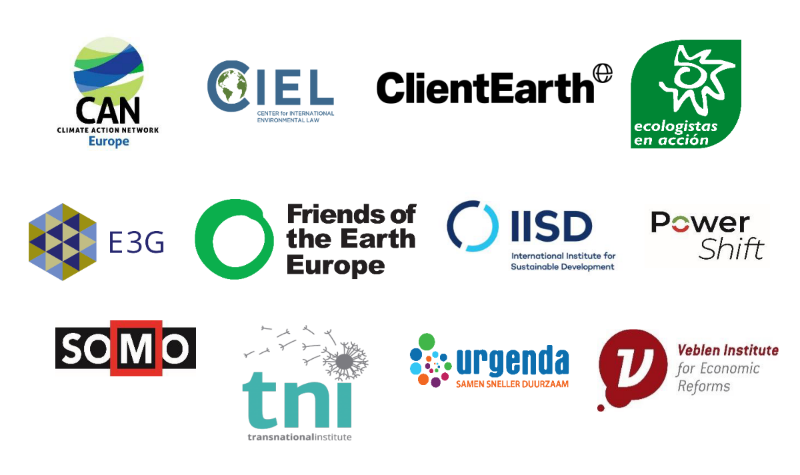
Recently, major EU countries such as France, Germany, Spain, Poland and the Netherlands are exiting the obsolete Energy Charter Treaty (ECT) in turns. The ECT reform deal fails to align the trade deal with the Paris Agreement and the European Green Deal climate goals. France, Germany and Belgium have now decided not to support the reform proposal, preventing the Council to have the required qualified majority for the EU to adopt the reform proposal. We call on Mr Frans Timmermans, Executive Vice-President of the European Commission for the Green Deal, to urgently design a plan to leave the ECT.
Dear Mr Timmermans,
While the COP27 is ongoing in Egypt, with the EU trying to find new ambitious pathways to deal with the climate crisis, at home the Council of the EU is considering whether to bring new life to the Energy Charter Treaty (ECT) by supporting its reform. Doing so would undermine the future of the European Green Deal at home and abroad.
Your leadership is more necessary than ever in this issue. The European Commission has driven the modernisation process as far as it was possible, but the reform falls short of complying with the Paris Agreement. The most problematic aspects of the ECT, its investor-state dispute settlement (ISDS) and its biased way of compensating investors, remain untouched. Given your engagement in similar negotiations, you are well aware of the dangers that old-style investment agreements and ISDS pose to climate action. Moreover, under the new ECT fossil fuels will remain protected for at least another decade in the EU and UK (and indefinitely in other contracting parties), including existing coal assets and future gas plants and pipelines. This means states will remain vulnerable to cases like those launched by RWE and Uniper against the Dutch coal phase-out plans.
Multiple Member States have recently concluded the reform was insufficient and not aligned with the Paris Agreement, publicly announcing their withdrawal from the Energy Charter Treaty: Poland, Spain, the Netherlands, France, Slovenia and Germany. Together with Italy, which withdrew in 2016, these states now represent more than 70% of the EU’s population. We know other Member States are considering this step too. It is clear now that the current Commission’s proposal to support the adoption of the ECT reform will not earn a qualified majority at the Council. Delaying the votes at both the EU and international level would only waste precious time – the climate emergency cannot afford this.
The European Commission must take hold of this situation and reassert its climate leadership, facilitating an ambitious solution at the Council that preserves EU unity and coherence. A coordinated withdrawal of the EU and the Member States from the ECT remains the only option to defend the integrity of the European Green Deal. Your leadership at this point is therefore crucial to foster a constructive dialogue with all Member States and ensure the Commission will propose a decision for an EU withdrawal. It would showcase Europe’s willingness to walk away from old systems that stand as a barrier to the Paris Agreement and spearhead new and better forms of governing sustainable investments. Instead, if the EU endorses the new text or remains in the ECT despite several Member States declaring it inconsistent with their climate action, this decision would send a very confusing signal to international investors and policymakers on the future of the EU’s climate transition.
We count on your intervention to avoid the risk the Commission services involved will continue to defend the ECT tooth and nail despite the reputational, legal and political risks involved. The ECT’s ‘sunset clause’ is often presented as a reason to prefer the reformed treaty to a withdrawal. However, we refer to our previous letters and studies in which we demonstrate that there is a way to neutralize the sunset clause. It is essential to take into account that:
- Given the opposition of the European Parliament and so many Member States, the amendments to the ECT might never come into force, dragging the EU into a legal limbo.
- The risks of the ‘sunset clause’ can be overcome after withdrawing: EU states can agree to neutralise it amongst themselves – in a way that would be fully consistent with international and EU law. The Commission has already suggested a similar approach to ensure the reformed ECT complies with EU law. The main difference would be that other ECT Parties like the UK, Norway and Switzerland could join this neutralisation of the sunset clause if they decide to withdraw as well, which remains a possibility.
The urgent messages from people on the climate frontline given at COP27 are a stark reminder of the need to accelerate the energy transition. The ECT, and ISDS at large, stand as a barrier to the EU’s commitment to phase out fossil fuels, at home and abroad. Staying within the ECT despite the withdrawal of key Member States will continue to allow fossil fuel investors to hamstring the EU’s climate action, undermining the Green Deal and Europe’s climate ambitions.We count on your leadership to urgently design a plan to leave the ECT, solve the current legal and political confusion and do what is best in the interest of the EU’s unity and climate transition.
Yours sincerely,
Signatories
Nathalie Bernasconi-Osterwalder, Executive Director, IISD Europe
Anaïs Berthier, Head of ClientEarth Brussels office
Fiona Dove, Executive Director of the Transnational Institute (TNI)
Manon Dufour, Head of Brussels for E3G (Third Generation Environmentalism)
Mathilde Dupré, Codirector of Veblen Institute
Audrey Gaughran, Executive Director Centre for Research on Multinational Corporations (SOMO)
Chiara Martinelli, Director of Climate Action Netwok (CAN) Europe
Marjan Minnesma, Director Urgenda Foundation
Jagoda Munic, Director Friends of the Earth Europe
Tine Laufer, Executive Director of PowerShift
Nikki Reisch, Director Climate & Energy Program of the Center for International Environmental Law (CIEL)
Luis Rico, Political Coordinator at Ecologistas en Acción
Related Content
We think you’d also like:

Stop the Energy Charter Treaty
The Energy Charter Treaty (ECT) is a major obstacle to fast and effective action on the climate and environmental crisis. Our transformation to a green and fair society will become harder, slower and more expensive if we don’t stop it.







